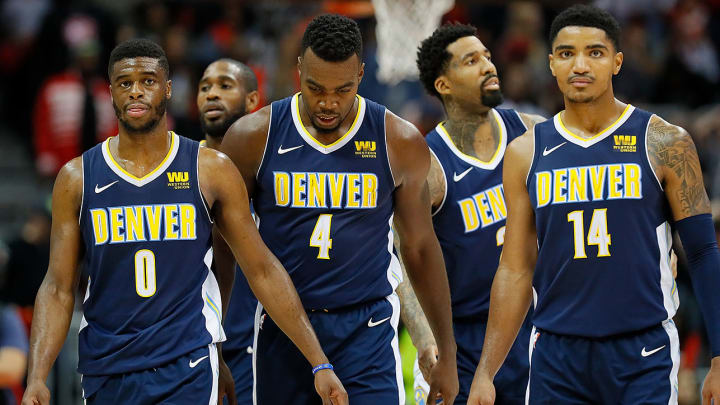Can the Nuggets Survive Paul Millsap's Injury?

Denver’s Plan A was a good one: Invest big in Paul Millsap, pair the versatile power forward with franchise center Nikola Jokic, and hope that the unselfish, intriguing frontcourt duo could lead the rising Nuggets back to the postseason for the first time since 2013. Unfortunately, those playoff aspirations may now hinge on Plan B.
The 32-year-old Millsap will reportedly undergo surgery after tearing a ligament in his left wrist during a loss to the Lakers on Sunday. He is expected to miss 2–3 months, placing his projected return sometime between mid-January and the end of the All-Star break. With that timeline, the four-time All-Star is expected to miss between 29 and 41 games.
This injury represents unchartered territory for Millsap, who has long boasted an Ironman reputation. During his 11-plus year career, Millsap has appeared in 94% of his team’s games and, until last season, he had never missed more than 10 games in a season. While Millsap has many virtues—basketball intelligence, mobility, two-way play—his reliability and consistency were surely major factors in the Nuggets’ willingness to offer him a three-year, $90 million contract last summer. After multiple coaching changes in recent years and assorted reports of locker-room friction in 2016-17, Millsap was and is the ultimate known quantity: skilled enough to handle heavy lifting, determined enough to do the little things, and mature enough to keep the drama at zero.
The Nuggets (10–7) haven't been perfect to start the season—they’ve suffered three unsightly blowout losses on the road—but they have looked promising. Denver has gotten back to its long-lost habit of smoking teams on its high-elevation home-court, with its only Pepsi Center losses coming against the Warriors and Wizards. The quintet of Jamal Murray, Gary Harris, Wilson Chandler, Millsap and Jokic has posted a stellar +12 net rating while logging the third-most minutes of any lineup in the NBA to date. Millsap filled an obvious defensive hole from last year’s group, and his team-first approach on offense has made him a natural fit in a group that features five genuine scoring threats.
Through Tuesday, Denver held the West’s sixth-best point differential with a comfortable margin above numerous teams with similar records. If given near-perfect health for its starters, the Nuggets’ combination of a top-five offense, an average defense, and a strong home-court advantage looked like a bankable playoff formula.
Instead, the Nuggets could be without their stabilizer for half the season. The good news: Tim Connelly’s unusual proclivity for stockpiling players at the same position leaves Malone with multiple Millsap replacement options. The bad news: Denver has fallen from a +4.5 net rating with Millsap on the court to a break-even 0 when he’s on the bench this season. In other words, there are healthy bodies to choose from, but all will likely prove to be steep downgrades.
Kenneth Faried, Denver’s starter for years, will likely see the greatest uptick in playing time, given that Millsap’s arrival forced him to the bench, where he’s logged a career-low 10.7 MPG. The aesthetic transition from Millsap will be stark on both ends. Offensively, Faried has no floor-stretching ability and he’s not a capable playmaker for others. Even so, he was able to play effectively off of Jokic last season, as the duo posted an eye-popping 121 offensive rating in nearly 500 shared minutes. Defensively, Faried lags badly behind Millsap, who is more comfortable switching through multiple positions, far more aware, and better at utilizing his strength/quickness combination. Playing Jokic/Faried together defensively will inevitably lead to easy buckets and some confused finger-pointing.
The schedule won’t really do Denver any favors here. Over the next two months, they are set to play at least 15 games against aspiring playoff teams in the West. That looks particularly foreboding given that just three games separated the West’s seventh, eighth and ninth seeds last season, and that at least 11 West teams can currently harbor playoff hopes. Uneven slow-starters like the Thunder and Grizzlies stand to benefit during Millsap’s absence, as do the Jazz and Clippers, who have been sidetracked by injury issues of their own. Meanwhile, the Pelicans, gutting admirably through their major depth concerns, need every break that they can get. Suddenly, Denver’s decision to release Jameer Nelson, who immediately stepped into major rotation minutes in New Orleans, looks like it could really come back to bite them.
Throughout his career, Millsap’s impact has far surpassed his acclaim. While a 2013 move to the East opened the All-Star gates and set him up for a trip to the conference finals with the Hawks, he never broke through as a household name even though his advanced stats consistently suggested he was one of the NBA’s most underappreciated players. Ironically, Millsap’s absence could wind up providing the cleanest measure of his value. After all, Atlanta went 40-29 with him last year and just 3-10 when he was out injured.
The Nuggets are surely better equipped now than the Hawks were to get by without him, but Millsap is exactly the type of guy who isn’t truly appreciated until he’s gone.

Ben Golliver is a staff writer for SI.com and has covered the NBA for various outlets since 2007. The native Oregonian and Johns Hopkins University graduate currently resides in Los Angeles.